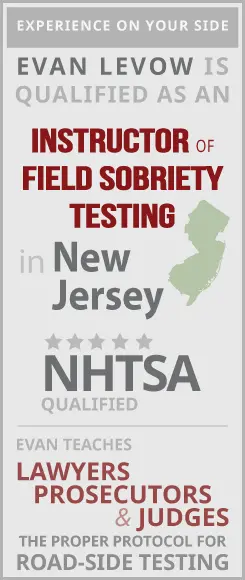Frequently Asked Questions
Q: Is it possible to defend against a DWI?
Absolutely. There are many ways to defend against a DWI charge. If you were arrested, contact a DWI attorney as soon as possible.
Q: What penalties does New Jersey impose for DWI?
Penalties for a conviction will vary in severity depending on whether it’s your first, second, or third offense.
First Offense
Effective December 1, 2019, all DWI and Refusal convictions now require installation of an ignition interlock device (IID) in a motor vehicle owned, leased, or principally operated by the driver. Proof of IID installation is required to have driving privileges restored.
On a first offense DWI conviction, the driver must surrender his/her New Jersey license to the court, which then forwards the license to the Motor Vehicle Commission (MVC). The driver is suspended until he/she gets an IID installed in the car he/she plans to drive, brings proof of installation to the MVC, pays a restoration fee of $200, and gets a new picture ID with “INTERLOCK” printed at the top.
If there is no BAC or the BAC is under 0.10%, license suspension will be from the day of conviction until proof of installation of an IID is presented to the MVC, and a new license is issued. The IID must remain installed for 3 months from the date of installation.
If the BAC reading is 0.10% but less than 0.15%, license suspension will be from the day of conviction until proof of installation of an IID is presented to the MVC, and a new license is issued. The IID must remain installed for 7-12 months from the date of installation.
If the BAC is 0.15% or above, license suspension is 3 months. An IID must be installed during the suspension, and must remain installed for 12 to 15 months after return of the driver’s license.
If the conviction is for driving under the influence of drugs, license suspension is 7 to 12 months, with no IID.
Fines for a first offense in court are between $600 and $800. Surcharges out of court are $3,000 to the State plus insurance company surcharges that range from $3,000 to more than $10,000. Alcohol classes are required for 12 to 48 hours. Jail can be imposed for up to 30 days.
Second Offenses
For a second DWI conviction, if you are convicted with a BAC of 0.08% or above, or if the State proves you were DWI based on your physical behavior, your New Jersey driving privileges will be suspended for 1 to 2 years. Fines are around $800. You must be sentenced to jail for a minimum of 2 days and a maximum of 90 days. You must perform 180 hours of community service. Your driving privileges will be restored when you show proof of installation of an IID in the car you intend to drive. You are restricted to only driving a vehicle that has an IID installed for 2 to 4 years following your suspension.
You will also have to pay costly surcharges: $3,000, payable at $1,000 every year for 3 years to the State, and a range of $3,000 to more than $10,000 in surcharges from your insurance company.
Third Offenses
On a third or greater conviction, the jail term is a mandatory 180 days served in a county jail. It is possible to serve up to 90 days in an in-patient rehabilitation facility. New Jersey driving privileges are revoked for 8 years. Fines and assessments in court total more than $1,325; surcharges out of court are $4,500 to the State, and there will be additional surcharges due to your insurance company ranging from $3,000 to more than $10,000. An IID must be installed for 2 to 4 years following your suspension.
Q: If I’m asked to submit to a breath test, can I refuse?
You can, but you’ll be charged with a violation for doing so.
According to New Jersey statute, you do not have the right to refuse a breath test without possible penalty. In New Jersey, the operation of a motor vehicle on any public or semi-public road, street, highway, or other area carries an “implied consent” that you will submit to breath testing. Note that this consent only exists when there is first a reason to believe that the alcohol in your blood is in excess of the legal limit.
Q: If I refused the breath test, are there defenses to that charge?
Yes, there are, depending on the facts of your case. For example, if there is no odor of alcohol and no indications of an alcohol based intoxication, there is no “reasonable suspicion” to believe that you are under the influence of alcohol, and the officer should not have put you on the breath testing machine. Technically, that circumstance should result in a dismissal of the Refusal charge. If you were charged with Refusal, please contact our office to discuss your case, and we will analyze your best course of action going forward.
Q: What are the penalties for Refusal to submit to a breath test?
On a first offense Refusal conviction, the driver must surrender his/her New Jersey license to the court, which then forwards the license to the Motor Vehicle Commission (MVC). The driver is suspended until he/she gets an IID installed in the car he/she plans to drive, brings proof of installation to the MVC, pays a restoration fee of $200, and gets a new picture ID with “INTERLOCK” printed at the top.
License suspension will be from the day of the Refusal conviction until proof of installation is presented to the MVC and a new license is issued. The IID must remained installed for 9 to 15 months from the date of installation. The conviction carries fines of $300 to $500, a State surcharge of $3,000 over 3 years, and separate insurance company surcharges of several thousand dollars over a 3 year period. The motorist will be referred to the Intoxicated Driver Resource Center (IDRC).
A second Refusal offense will result in a 1 to 2 year license suspension. An IID must be installed during the suspension and must remain installed for 2 to 4 years after the return of the driver’s license. The conviction carries a fine of $500 to $1,000, a State surcharge of $3,000 over 3 years, and separate insurance company surcharges of several thousand dollars over a 3 year period. The motorist will be referred to the Intoxicated Driver Resource Center (IDRC).
A third Refusal offense will result in a 8 year license suspension. An IID must be installed during the suspension and must remain installed for 2 to 4 years after the return of the driver’s license. The conviction carries a fine of $1,000, a State surcharge of $4,500 over 3 years, and separate insurance company surcharges of several thousand dollars over a 3 year period. The motorist will be referred to the Intoxicated Driver Resource Center (IDRC).
Q: After the suspended driving privileges period has passed, is my license automatically reinstated?
No. A fee of $200, paid to the Motor Vehicle Commission (MVC), is required to restore your New Jersey privileges,
Even if you are an out of state driver, you must pay $200 to MVC to reinstate your privileges in New Jersey, otherwise you will remain suspended in New Jersey. This will eventually catch up to you when your home state does not renew your driving privileges because your name appears on the National Driver Register (NDR) as still being suspended in New Jersey
Q: If sentenced to jail time, do I have any options other than spending time in jail?
For first and second offenses, if you are sentenced to jail, you may have other options, specific to your situation.
For third or greater offenses, you must go to jail for 180 days, however, 90 of those days may be served in an in-patient drug or alcohol rehabilitation facility.
Q: If I have prior DWI convictions, can I have them overturned or nullified so that they do not affect a current arrest?
Yes, it’s possible to have prior convictions not considered in a current case. This is called Post Conviction Relief.
You would have to go back to the original court and seek to have the case reopened, or argue that the conviction cannot be used to put you in jail in any current or future matter. Learn more here. Link not working.
Call us as soon as possible so that possible alternatives can be considered
Q: Does a prior DWI conviction from more than 10 years ago count as a previous offense?
If they are your first and second offenses, DWI convictions that occur more than 10 years apart will be treated as unrelated when sentencing for the second. In this case, a second conviction will be sentenced as a first offense.
However, a third conviction that occurs more than 10 years after the second will be sentenced as a second offense rather than another first.
Q: Can the IDRC require me to undergo additional counseling or classes?
You are required to comply with the screening, evaluation, referral programs and payment of fees for:
- the Division of Alcoholism and Drug Abuse’s Intoxicated Driving Program Unit
- the IDRC
- a program of alcohol and drug education and highway safety
If you do not meet minimum requirements in any of these areas, you can be required to take additional counseling or classes involving additional fees.
Q: What if I choose not to comply with IDRC classes or counseling recommendations?
You will be subject to a mandatory two-day jail sentence to be spent in the county jail and a loss of driving privileges until you comply with the requirements.
Q: What is the DWI law with regard to being under 21 years old?
In addition to any penalties imposed under the usual DWI or other criminal laws, a blood alcohol concentration of between .01 percent to .08 percent will result in the loss of your rights to operate a motor vehicle in New Jersey or to get a license to drive in New Jersey for 30 to 90 days, starting on either the eligibility date for obtaining a license or the conviction date, whichever is later.
You will also be sentenced to community service for 15 to 30 days and will need to satisfy the IDRC fee and program requirements.
Find more information on our Underage DWI page.


